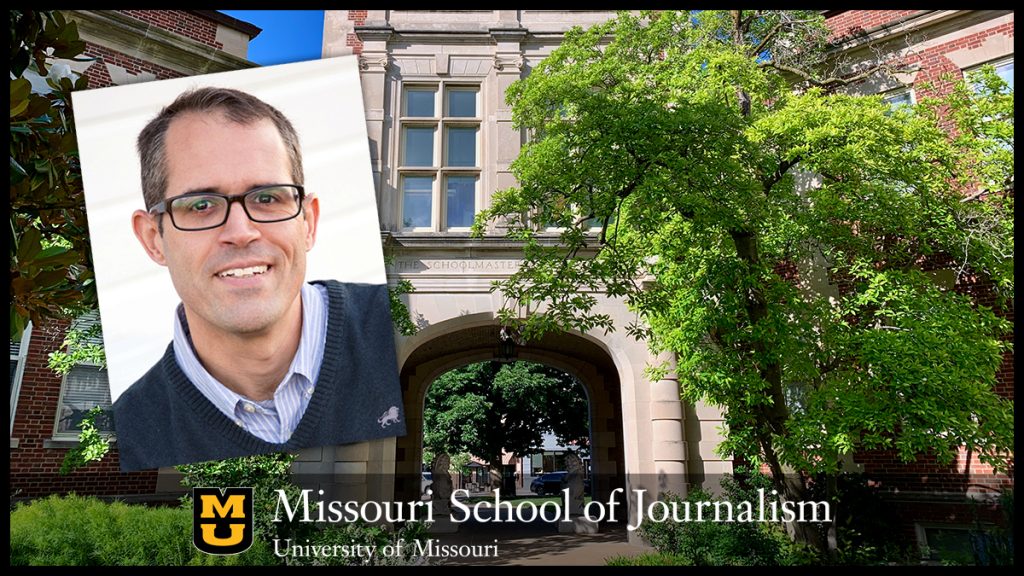Missouri School of Journalism’s Jared Schroeder earns $5,000 research grant to help journalists fight malicious lawsuits

Editor’s note: For more in-depth information about the issues surrounding SLAPP lawsuits, read Sara George’s article here.
COLUMBIA, Mo. (July 23, 2024) — Jared Schroeder, an associate professor at the Missouri School of Journalism, has earned a $5,000 grant from the Society of Professional Journalists (SPJ) to support a project meant to help journalists and publishers navigate the risk of SLAPP lawsuits. SLAPPs are “strategic lawsuits against public participation” that are meant to discourage or punish certain coverage.
The project, supported by the School of Journalism’s Reynolds Journalism Institute (RJI), is using insights from research performed by Schroeder with the help of three graduate students to update an anti-SLAPP legal guide hosted by the Reporters Committee for Freedom of the Press.
“Jared’s research offers practical information that can help news organizations respond to these lawsuits and puts RJI at the forefront of an important industry issue,” said Randy Picht, executive director of RJI. “Tools that enable us to fight intimidation and preserve a free press are vital, especially for community newsrooms that don’t have the budget for a team of lawyers or a long court battle.”
Anti-SLAPP statutes vary widely from state to state, with 17 states lacking them entirely and others, like Missouri, featuring laws that only apply in a narrow set of circumstances. This can allow litigants with nefarious motives to wield the legal system to their advantage.
“A person who has a certain amount of power can say, ‘I don’t like what this person published about me,‘” Schroeder said. “In the end, they will lose a defamation lawsuit, but they’re not trying to win a legal victory. They’re trying to drain resources from a news organization. They’re trying to make people afraid to publish about them.”
A person who has a certain amount of power can say, ‘I don’t like what this person published about me.’ In the end, they will lose a defamation lawsuit, but they’re not trying to win a legal victory. They’re trying to drain resources from a news organization. They’re trying to make people afraid to publish about them.
Jared Schroeder
While the project aims to provide up-to-date information for all 50 states, a key goal is to add detailed entires to the guide even for those states with no specific laws related to SLAPP, given that journalism in these states could be most vulnerable to the impacts of intimidation.
“Each entry includes cases that have happened in that state, and if there’s no anti-SLAPP law, we’re looking at what people in that state have tried to do to protect themselves,” Schroeder added. “Some states have anti-frivolous lawsuit laws, malicious lawsuit laws that you can call upon. Or just rules and procedures.”
The project has already produced updated entries for nearly two dozen states, though the new entries will not begin appearing in the guide until later this year.
Schroeder’s research team consists of doctoral student Živilė Raškauskaitė, currently a foreign news editor for non-profit news network Lithuanian National Radio and Television; master’s student Skye Lucas, who won Top Student Paper at the AEJMC Southeast Colloquium in March for her case studies on anti-SLAPP laws in 10 states; and Sara George, BJ ’24, who graduated in May and plans to pursue a master’s degree at the London School of Economics starting in the fall. (George recently penned an inside look for RJI at how news organizations like Deadline Detroit and Iowa’s Times Herald have dealt with SLAPP lawsuits.)
Upon winning the Top Paper award in March, Lucas summed up the need for a more robust and detailed anti-SLAPP guide.
“There is a lot of awareness of SLAPPs, but we really don’t have a definitive, concrete understanding of what they are, because there is no federal anti-SLAPP legislation,” Lucas said.
The project fits neatly into Schroeder’s broader interest in communication law — his work often centers around the ways in which social and technological issues that impact the industry intersect with the U.S. judiciary and constitutional theory. Most recently, he authored a book examining the impact of AI on America’s conception of free speech.
A knack for mentorship
As Lucas’ award-winning contributions to the anti-SLAPP project demonstrate, Schroeder — in less than a year since arriving at the School of Journalism — has built a reputation for a brand of mentorship that nurtures independence in his students. Several of his research assistants have solo-authored research papers, including those, like sophomore Stamps Scholar Ivy Reed, who have no previous experience with formal academic research.
Reed recently won second place at the national AEJMC student paper competition and will be a rare undergraduate presenter at the AEJMC conference’s prestigious top papers panel in August. Her paper, detailed here in March as she joined Lucas in presenting at the Southeast Colloquium, plumbs the neglected depths of turn-of-century social reformer Jane Addams’ contributions to the fields of First Amendment and communication theory.
“Ivy can do anything she wants,” Schroeder said. “She’s so smart. I would tell her, ‘Go write an academic paper introduction,’ and how is she supposed to know what that looks like? But she would come back with a great introduction.”
Schroeder’s approach to working with his students — a win-win dynamic of contributing to the industry’s body of research while maximizing student growth — is not far removed from the way he conducts all his work. In fact, echoes of that collaborative-but-generous ethic are evident in the way he describes the anti-SLAPP guide project.
“All these wins are happening,” Schroeder said. “The graduate students are learning, and I’m contributing meaningfully with my work. RJI and SPJ are working together to help the Reporters Committee for Freedom of the Press support journalism. It’s a win-win-win-win.”
Updated: July 23, 2024